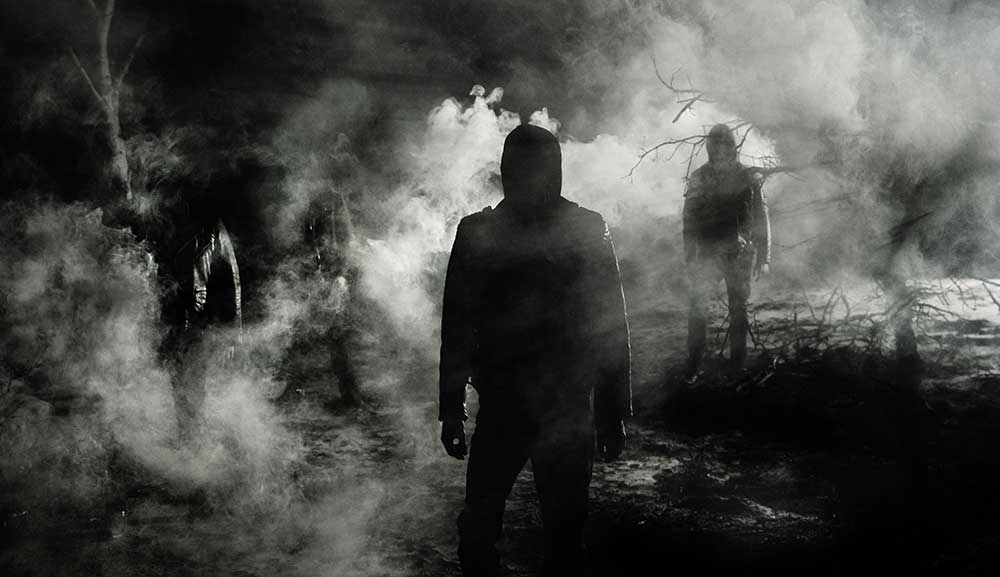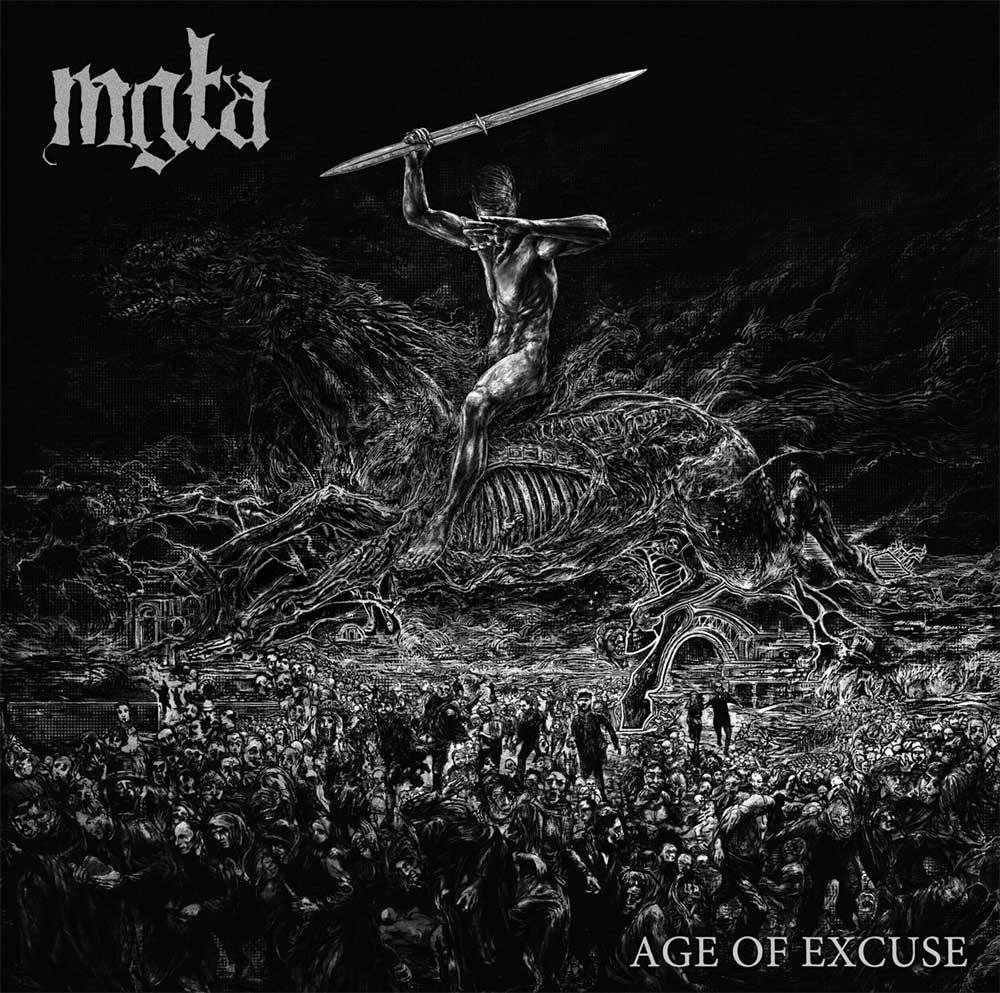Mgła
2021-11-24
by Niklas Göransson
Would a new flood please finally come? Dismal contemplations and the case for independence, courtesy of M from Polish black metal phenomenon Mgła.
This is an excerpt from the full article, which is twice as long and published in Bardo Methodology #7. The same issue also includes conversations with BLACK WITCHERY, GOSPEL OF THE HORNS, MACABRE OMEN, THORYBOS, ANTEDILUVIAN, ATLANTEAN KODEX, Cold Meat Industry, Mortiis, MONUMENTUM, WARLOGHE, ORDO TEMPLI AETERNAE LUCIS, and HEXVESSEL.
– “Age of Excuse” was, for the most part, recorded similarly to “Exercises in Futility”: we tracked everything in our rehearsal place, then edited and mixed it at my home studio. Having now made quite a few albums together, Darkside and I knew precisely what we wanted. Meanwhile, we had amassed both the gear and necessary know-how to achieve it. In comparison to its predecessor, “Age of Excuse” is a little colder and more abrasive – a production that goes with the concept while simultaneously retaining clarity. It was also meant to have a dry sound; as in, not obviously processed and with little to no artificial space. We worked with pre-production demos and recorded it in parts. Drums first, then guitars and so forth. Nothing was tracked as a full live band.
“Age of Excuse” – the heavily anticipated fourth album of MGŁA – was released in September 2019 by the band’s own outfit, No Solace, in collaboration with Northern Heritage Records.
– The recording process was a fairly standard affair, but with a strict and idealised approach focused on getting everything right at the source level. If the playing did not live up to our standards, we kept on trying until such was the case. If the timbre didn’t exactly match expectations, I’d scratch five times forty-two minutes’ worth of guitar tracks and start over. You should never attempt to ‘fix it in the mix’ because – ultimately – you won’t. Another valuable lesson has been to not skimp on the technical; always make sure to use industry-standard equipment whenever possible. Then, if something doesn’t sound quite right, you can be one hundred percent sure that the fault is not with the gear but its operator.
One aspect I’d been anticipating was the drum arrangements and execution thereof. Since Darkside has performed on all four studio albums of MGŁA – from the 2008 debut, “Groza” – one is able to follow his progression and observe how he’s gradually become an intrinsic part of the band’s musical identity.
– Darkside’s integral role in MGŁA far exceeds mere percussion: all material is arranged by the two of us together. To the best of my knowledge, Darkside’s drumming progress is entirely self-taught – although his method of development and associated self-criticism would utterly crush and humiliate anyone lacking even a fraction of the willpower he possesses.
During the project’s early days, MGŁA initiated a recording by tracking various drum improvisations in different beats – using music software, these would then be cut and pasted into full songs. I have no idea if this is commonplace in black metal nowadays, but it occurred to me that it might be a remnant from M’s extensive background in electronic music.
– Possibly, but it also stems from the fact that I started out not by playing in a band but by doing everything by myself, on my own. Therefore, it was natural to arrange songs in blocks rather than write material meant to be performed by a line-up of musicians. As abhorrent as it might sound to metal purists, it’s true. The last time we did the cut-up drums was with “Groza”. Actually, the first version of what was intended to become “With Hearts Toward None” (2012) was created the same way… but results fell short of expectation, so we archived it and re-recorded the whole thing. Still to this day, we never rehearse our material beforehand; instead, we work with pre-production demos. This means we won’t know what the songs sound like in a live setting until we begin figuring out how to play them as a full band.

Are you actively trying to become a better guitarist?
– I see myself more as a producer than a musician, so proficiency in any particular musical instrument is not an aim in and of itself. I pretty much never pick up the guitar just ‘for fun’ and can’t play anything besides my own material. I can perform MGŁA’s 16th notes tight for sixty-plus minutes, or the hand-wrenching chords used in KRIEGSMASCHINE, but ask me to play “Stairway to Heaven” and I wouldn’t know where to start – or why I should even be doing so in the first place. However, when I come up with a riff that’s too difficult to play comfortably, I’ll simply practise until it works. Also, frequent rehearsing and performing live ensures my basic skills don’t deteriorate.
Perhaps I’m imagining things, but it seems to me as if M’s vocals are becoming a bit more theatrical. Case in point, “Age of Excuse VI”: ‘Empires get wrecked. Principles get crushed. Saviours get crucified. History gets what? History fucking gets over it all.’ As far as I can recall, this is his most immersive delivery yet.
– That particular part is one of very few instances where we kept the first take. It was literally the case of, ‘I’ve got an idea for this section, but it’s probably better shown than described. I’ll just try not to overdo it…’ Of course, that’s precisely what I did – yet it felt fitting somehow. A MGŁA song generally upholds similarly high emotional tension throughout its entirety; there aren’t many drastic or cinematic tension-release patterns. As such, I naturally gravitate towards a vocal delivery that’s uniform but powerful rather than something varied and expressive. We had to redo quite a few parts because it was too audibly obvious that I was singing through clenched teeth.
Speaking of which: that revolting sound in the beginning, is it the gnashing of teeth?
– Indeed it is – recorded in-house, courtesy of our live guitarist, E.V.T. There are several classic genre examples of simple and bare yet extremely effective sounds: the gravestone screeching in BATHORY, walking through wind and snow in GORGOROTH, or whip-lashes in DARKTHRONE. Considering its emotional content, I thought the gnashing of teeth and guitar feedback kicking in was pretty much the way to set the tone for a black metal album. Along with the shrieks of vultures fighting over carrion, which is what opens “Exercises in Futility”.
In Bardo Methodology #1, M mentioned not experiencing feelings the way most people do. One wonders how someone who claims emotional sterility manages to garner worldwide renown for not only highly evocative melodies but also stirring and melancholic atmospheres. Thus, I’m curious what he draws on for creation – meaning, is it a deliberate intellectual process or something more akin to a flow state? I don’t quite picture him as someone who entertains esoteric notions such as that of the Muse.
– I’m a walking, talking, ‘dead inside’ meme. At least that’s the armour I wear for most of the time and towards most people. Exceptions do happen, and I suppose some of those precious moments end up making their way into my artistic output. However, much of the credit goes to Darkside, who acts as an initial filter for the musical source material. I record ideas, literally hundreds of them, for subsequent assessment and then send along whatever is approved to Darkside for further insight. I’d say the riff-rejection rate in MGŁA is well over eighty percent; whatever remains is arranged by the two of us together. There’s so much work and experimentation with selection and structure for each song that I’d rather see this part as closer to the type of focus-trance you’re referring to. As uplifting as the memory of a romantic flow of inspiration would be, there’s far less of that in MGŁA than the hard and tedious work of dissecting every second of what eventually becomes a song. There is some place for inspirational free flow, but any result must pass rigorous inspections later on.

Despite heavy courtship from all kinds of major labels, “Age of Excuse” sees MGŁA stick to their usual formula of self-releasing. It’s also the first album since their so-called commercial breakthrough.
– We still haven’t bothered applying for EAN numbers for any of our previous releases, which in the eyes of the ‘mainstream’ lands us firmly in the ‘amateur self-publishing’ category. Or as an ‘unexplainable aberration’ where five-digit pressing runs lack the barcode required to be sold in supermarkets. Either way is fine by me. Offers still come once in a while but are always swiftly processed with a polite ‘Thanks, but no thanks.’ Our releases are conceptualised, recorded, mastered, ordered from the pressing plant, and then distributed – right down to the packaging and mailing of parcels – by ourselves. It’s obviously a massive workload of oftentimes tedious repetition of tasks, but all this comes with a sense of fulfilment. The romantic idealist in me would like to think that maybe even the ice-cold heart of an A&R shark would melt at the sight of a band so stubbornly independent as MGŁA, perhaps realising how such phenomena are best left to develop and flourish in their own unique way. Shortly thereafter, the inherent realist within comes up with ninety-nine better reasons: transfer of copyright ownership being number one.
As for the album’s themes, M explains that – compared to previous works from MGŁA – “Age of Excuse” has less focus on the individual and more on the collective. As in, our species.
– To provide a backdrop: the current consensus is that Homo sapiens has been present on the planet for at least 100,000 years. That’s just modern man, without the prior several million years of Homo habilis, Homo erectus, and so forth. The agricultural revolution took place around 10,000 BC at the earliest. The industrial revolution – 1800 AD. Information society arose around the year 2000; and that’s outside consensus, only my own approximation. One human generation can be counted as twenty-five years. The evolution of our species is defined as changes in the hereditary characteristics of biological populations throughout successive generations. From the dawn of mankind to the agricultural revolution, Homo sapiens underwent 3,600 generations. An additional 472 generations later came the industrial revolution.
That was nine generations from where we are today. The immediate conclusion, according to M, is that humanity’s social and intellectual development has far outrun its biological evolution.
– Our nervous apparatus is designed to facilitate the collection of apples and throwing of sharp sticks at small game, processing just the right amount of stimuli as to not interfere with these tasks. Our psychology is designed for close-knit communities somewhere in the range of 150 people, not a multimillion megalopolis. Enter information society and its clergy: the media. The result is a global gallopade of existential crisis.

This was an excerpt from the full article, which is twice as long and published in Bardo Methodology #7. The same issue also includes conversations with BLACK WITCHERY, GOSPEL OF THE HORNS, MACABRE OMEN, THORYBOS, ANTEDILUVIAN, ATLANTEAN KODEX, Cold Meat Industry, Mortiis, MONUMENTUM, WARLOGHE, ORDO TEMPLI AETERNAE LUCIS, and HEXVESSEL.



